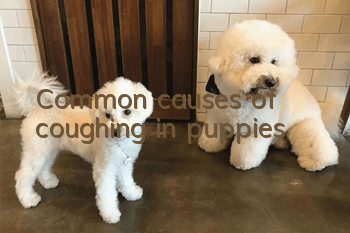Common causes of coughing in puppies

Dog coughing is one of the most common problems in breeding, and sometimes it can cause serious consequences. There are several diseases that cause dog coughing.
Causes of dog cough
Pathological cough:
Cold:
Cold is an acute systemic disease whose main symptom is inflammation of the upper respiratory tract mucosa. When the body's resistance is low and the defense function of the upper respiratory tract mucosa is reduced, the bacteria that are usually present in the respiratory tract multiply in large numbers, which can lead to the occurrence of this disease.
Clinically, it is characterized by runny nose, shortness of breath, and varying degrees of elevated body temperature. There is a cough and pus-like nasal discharge.
Depressed spirit, loss of appetite or loss of appetite, flushed conjunctiva, eyes blurred and watery.
There is a cough, pus-like nasal mucus, accelerated breathing, and elevated body temperature.
Pneumonia:
Dogs are infected by bacteria, mycoplasma, mycoplasma, or viruses due to reduced body immunity, resulting in long-term respiratory symptoms, repeated infections, and deep infection of the lungs, causing inflammation.
Initial symptoms include runny nose, dry cough, and difficulty breathing.
Runny nose, dry cough, difficulty breathing.
Lack of energy, reduced appetite or no eating, elevated body temperature, and shortness of breath.
Bronchitis:
Bronchitis is an acute or chronic inflammation of the bronchial mucosa of dogs and cats under the action of various pathogenic factors. After the dog is sick, the dog will suffer from loss of appetite, vomiting, and dry cough. Later, as the exudate increases, the cough will change from dry to wet cough. , serous fluid flows from both nostrils, and the amount of discharge increases after coughing.
Loss of appetite, vomiting, dry cough, lack of energy, slightly elevated body temperature,
The body temperature continues to rise, the pulse speeds up, and breathing becomes difficult.
Canine Distemper:
Canine distemper is a highly contagious and fatal infectious disease caused by the canine distemper virus. After the dog becomes sick, the body's immunity will decrease, the body temperature will be biphasic, and respiratory and digestive tract symptoms will appear repeatedly. In the later stage, the virus Infringes on the central nervous system and causes neurosis.
Body temperature as high as 39.5 to 41 degrees Celsius; loss of appetite and depression;
Nervous symptoms, damage to the brain, manifested as epilepsy, spinning in circles;
Pharyngitis:
Because the dog’s pharyngeal mucosa is extremely deepAn inflammation caused by the stimulation of hard food, sharp foreign objects, chemicals, or hot and cold. When the dog's pharynx is touched, the sick dog dodges, stretches its neck, shakes its head, and coughs.
The head and neck are stretched and unwilling to move. When the pharynx is touched, the sick dog dodges, stretches its neck and shakes its head, and coughs;
Sick dogs have difficulty swallowing food or spit out food pieces;
Heart disease:
The heart is responsible for the pumping function of sending blood to all parts of the body. If the pumping function cannot operate normally, it will not be able to transport blood to the lungs and the whole body, and it will not be able to recover the blood returned from the lungs and the whole body, and the lungs will be damaged. Forced to operate at a high load to seek more fresh oxygen and more blood flow, dogs will have symptoms of pulmonary edema, difficulty breathing or even coughing.
Coughs caused by respiratory infections usually resolve within a few days with simple treatment.
Coughs caused by heart disease are different. This kind of cough usually occurs after the dog exercises or at night.
Cough caused by improper feeding:
Swallowing foreign bodies:
In the eyes of dogs, anything can be put in the mouth and bitten. When the owner finds that the dog is biting randomly, he will definitely stop it with words immediately, but most of them are useless. At this time, the owner who has a bad temper will fight with the dog. , and even directly opened the dog's mouth to dig out foreign objects.
Symptoms: After swallowing foreign bodies, dogs are prone to retching, coughing, constipation or diarrhea, lack of energy, loss of appetite, abdominal pain, and refusal to be touched. Severe cases may cause difficulty breathing.
Retching, coughing, constipation or diarrhea, lack of energy, and decreased appetite.
If you find that your dog has swallowed a large foreign object, you should first stop eating and drinking.
Recommended Good Things
Aineng Pet Odor Eliminating Disinfectant can effectively remove body odor/feces odor and other odor molecules! Effective in treating skin diseases caused by fungi/bacteria! Can kill parvovirus/canine distemper virus/coronavirusetc!
It is edible grade for pets, does not contain fragrances, does not contain chemicals, can be sprayed directly, and is harmless to human pets!
Consultation: 13028809308 (WeChat synchronization)
Scan the QR code on WeChat to enter the purchase
- How to train a two-month-old puppy?
- Summer is hot, how to prevent heatstroke in dogs?
- How long is the longest life span of a golden retriever? What is the average life span of a golden retriever?
- Why does the dog have slippers in his mouth? How to stop it from chewing?
- How old can a golden retriever eat dry dog food?
- Dog eyes have a cloudy film
- What causes dogs to twitch?
- What is the treatment for pneumonia in dogs?
- Can dogs also suffer from hypoglycemia? What should I do if my pet dog has hypoglycemia?
- Puppy curled up sleeping



